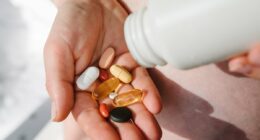Share this @internewscast.com
Wimbledon’s Championships are among the biggest sporting events of the year, attracting celebrities and tennis fans from all over the world. However, before heading to those London courts this weekend, it might be wise to follow a key piece of NHS advice.
The UK health service took to Twitter, formerly X, early this morning to warn Wimbledon fans of a few risks. These are specifically linked to joining ‘The Queue’, where people typically camp overnight or arrive early in the morning, hoping to secure a ticket or grounds pass on the day.
“If you’re planning on joining The Queue today, or watching the tennis outside, make sure to stay safe and avoid getting sunburn,” the NHS alert said. “Even if it’s cloudy, UV rays can still cause sunburn. But maybe take an umbrella too. Just in case…”
The NHS warning comes amidst sweltering weather in the UK, with peak temperatures of 34.7°C recorded in England on Friday. Yesterday, Wales also reported its hottest day of the year, with 32.4°C observed in Cardiff, and even the Scottish Highlands saw unbelievable highs of 28.9°C.
However, it’s a common misconception that such hot temperatures can directly impact the strength of UV rays. Instead, the sun’s position and the amount of clouds, dust, and pollution in the sky are among the factors that have the greatest impact on UV levels.
Even still, health specialists generally recommend wearing sunscreen in all weathers to better protect skin health in the long term. Niamh McMillan, a Superdrug Pharmacy Superintendent, previously told the Mirror: “It’s best to apply sunscreen 15 – 30 minutes before going outside. It should then be reapplied to exposed areas, 15 – 30 minutes after sun exposure.
“People should always try to reapply sunscreen after vigorous activity such as swimming or excessive sweating, that could remove the sunscreen.”
SPF – or Sun Protection Factor – is the amount of protection a cream can provide against ultraviolet B (UVB) – a type of radiation that’s commonly linked to skin burns. Bottles of SPF usually rank this on a scale from two to 50+, with the latter offering the most protection overall.
Meanwhile, any displayed star rating will unveil a product’s level of protection from ultraviolet A radiation (UVA). While this variation is most associated with skin ageing, enlarged pores and fine lines, both UVA and UVB can trigger an increased risk of cancer.
Applying SPF at the right time is therefore crucial to eliminating this chance. Sun cream generally takes around 30 minutes to absorb into the skin. If the application is left too late, the cream is more likely to wash off when you sweat, rendering it ineffective.
It’s vital to triple check an SPF’s use-by date too. Although most bottles have a shelf-life of 30 months, they are often only usable for a certain time period after being opened.
Niamh continued: “We all have different skin types, so it is important to choose the right type of sunscreen for your skin. The Sun Protection Factor (SPF), is commonly interpreted as how much longer skin covered with sunscreen takes to burn, compared to unprotected skin.
“So, if you burn after 10 minutes in the sun, then using a sunscreen labelled with, say, SPF15, is taken to mean that you can safely remain in the sun for 10 x 15 = 150 minutes, or two-and-a-half hours, before burning.”











